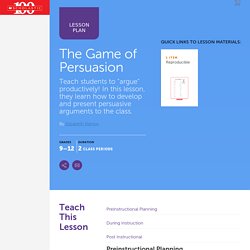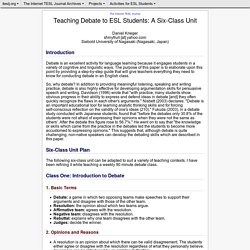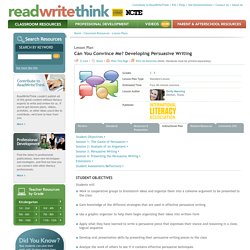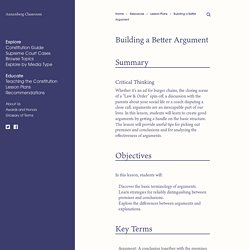

Useful Phrases for Discussion and Debate in English. 1.

Introducing a point First of all I’d like to point out…The main problem is…The question of…Speaking of…What we have to decide is… 2. Enumeration of points First of all, I’d like to say…In addition to that…Moreover,…Furthermore,…Another example of this is..First, second, third…Finally,… 3. Top 10 Business Arguments - The Executive Advisory. THE TOOLKIT Top 10 Business Arguments There are many arguments you can use when trying to build your case.

Their viability and impact will vary depending upon the situation and audience. However, in business our research has identified the top ten strongest business arguments for building your case and getting your point across. - 13 Arguing & Discussing. In academic life, arguing and discussing is often part of a larger element of speaking.

In arguing and discussing, you are expected to present two or more points of view and discuss the positive and negative aspects of each case. On the basis of your discussion, you can then choose one point of view and persuade your readers that you are correct. This means giving your opinions (positive and negative) on the work of others and your own opinions based on what you have learned. You need to evaluate arguments, weigh evidence and develop a set of standards on which to base your conclusion. As always, all your opinions must be supported - you should produce your evidence and explain why this evidence supports your point of view. There are two main methods of presenting an argument, and in general the one you choose will depend on exactly what the speaking task is(See Preparing: the Task and Organisation for more information). a. At its simplest your essay plan will be as follows: b. Example. The Game of Persuasion. Day 1 Step 1: Begin the lesson with this statement: "Raise your hand if you usually win an argument, any argument — with your siblings, parents, friends, boyfriend/girlfriend, and so on.

" Ask those who raised their hands: "Why do you think you win? What do you do or what techniques do you use to win your arguments? " Generate a brief discussion. Include ideas like everyone doesn't think the same way and has different viewpoints of various topics. Argument Games! Play These Fun Games to Practice Analyzing Arguments and Writing Arguments — TeachWriting.org. I absolutely LOVE teaching argument writing because of its natural ability to engage students, and the amazing life skills (21st century skills) naturally taught within the unit.

What teenager does not love an opportunity to argue their opinion? I have long since allowed my students the opportunity to choose their topic for the final assessment piece. It is wonderful to see their truest passion sprawled across the page. Teenagers are nothing if not passionate about their beliefs. When this passion is coupled with a new, greater understanding of the larger world around them, the product is truly amazing. Yet, I found that even with this passionate topic, students still struggled with the essential argument writing skills.
I spent some time over the summer wracking my brain for ideas on improving these skills without removing the natural engagement my students have with this unit. The answer came within a professional development course taken during workshop week. Krieger - Teaching Debate to ESL Students: A Six-Class Unit. The Internet TESL Journal Daniel Kriegershinyfruit [at] yahoo.comSiebold University of Nagasaki (Nagasaki, Japan) Introduction Debate is an excellent activity for language learning because it engages students in a variety of cognitive and linguistic ways.

The purpose of this paper is to elaborate upon this point by providing a step-by-step guide that will give teachers everything they need to know for conducting debate in an English class. So, why debate? In addition to providing meaningful listening, speaking and writing practice, debate is also highly effective for developing argumentation skills for persuasive speech and writing.
Six-Class Unit Plan. Can You Convince Me? Developing Persuasive Writing. Home › Classroom Resources › Lesson Plans Lesson Plan Student Objectives Session 1: The Game of Persuasion Session 2: Analysis of an Argument Session 3: Persuasive Writing Session 4: Presenting the Persuasive Writing Extensions Student Assessment/Reflections.

How to teach supporting your arguments. The ideas behind this article go back to one of the first specific conversations skills courses I taught, which ended with a graded debate to test what students’ had learnt.

Despite my students’ best efforts to use the giving and asking for opinions language we had practised, the conversation naturally included much more support for their arguments than actual opinions. In the next few courses I therefore switched to a much more sensible format of a quick lesson or two on strong and weak opinions before classes on giving examples, sharing personal experiences, etc. My Favorite Lesson Plan for Teaching Claim, Evidence, and Reasoning. Building a Better Argument – Annenberg Classroom. Summary Critical Thinking Whether it’s an ad for burger chains, the closing scene of a “Law & Order” spin-off, a discussion with the parents about your social life or a coach disputing a close call, arguments are an inescapable part of our lives.

In this lesson, students will learn to create good arguments by getting a handle on the basic structure. The lesson will provide useful tips for picking out premises and conclusions and for analyzing the effectiveness of arguments. Objectives.